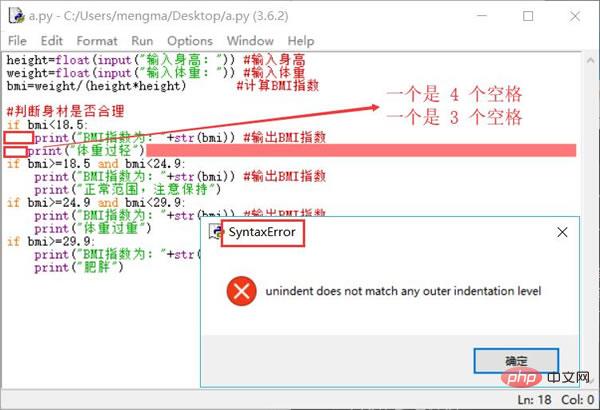What are the indentation rules of python
Python’s indentation rules: For class definitions, function definitions, flow control statements, exception handling statements, etc., the colon at the end of the line and the indentation of the next line indicate the beginning of the next code block, and the indentation The end of indicates the end of this code block. Usually, a length of 4 spaces is used as an indentation amount (a Tab key represents 4 spaces).

The operating environment of this tutorial: windows7 system, python3.7 version, DELL G3 computer
Python indentation rules
Unlike other programming languages (such as Java and C language) that use braces "{}" to separate code blocks, Python uses code indentation and colons ( : ) to distinguish code blocks. between levels.
In Python, for class definitions, function definitions, flow control statements, exception handling statements, etc., the colon at the end of the line and the indentation of the next line indicate the beginning of the next code block, and the end of the indentation It indicates the end of this code block.
Note that to indent code in Python, you can use spaces or the Tab key. But whether you type a space manually or use the Tab key, a length of 4 spaces is usually used as an indentation amount (by default, a Tab key represents 4 spaces).
For example, in the following Python code (it involves knowledge that has not been learned yet, beginners do not need to understand the meaning of the code, they only need to understand the indentation rules of the code block):
height=float(input("输入身高:")) #输入身高
weight=float(input("输入体重:")) #输入体重
bmi=weight/(height*height) #计算BMI指数
#判断身材是否合理
if bmi<18.5:
#下面 2 行同属于 if 分支语句中包含的代码,因此属于同一作用域
print("BMI指数为:"+str(bmi)) #输出BMI指数
print("体重过轻")
if bmi>=18.5 and bmi<24.9:
print("BMI指数为:"+str(bmi)) #输出BMI指数
print("正常范围,注意保持")
if bmi>=24.9 and bmi<29.9:
print("BMI指数为:"+str(bmi)) #输出BMI指数
print("体重过重")
if bmi>=29.9:
print(BMI指数为:"+str(bmi)) #输出BMI指数
print("肥胖")Python has very strict requirements for code indentation. The indentation amount of code blocks at the same level must be the same, otherwise the interpreter will report a SyntaxError exception. For example, if you make incorrect changes to the above code, set the indentation of 2 lines of code in the same scope to 4 spaces and 3 spaces respectively, as follows:
if bmi<18.5:
print("BMI指数为:"+str(bmi)) #输出BMI指数
print("体重过轻")
Beginners can understand the Python indentation rules this way. Python requires that each line of code belonging to the same scope must have the same indentation amount, but there is no hard and fast rule about the specific indentation amount. .
【Related recommendations: Python3 video tutorial】
The above is the detailed content of What are the indentation rules of python. For more information, please follow other related articles on the PHP Chinese website!

Hot AI Tools

Undresser.AI Undress
AI-powered app for creating realistic nude photos

AI Clothes Remover
Online AI tool for removing clothes from photos.

Undress AI Tool
Undress images for free

Clothoff.io
AI clothes remover

Video Face Swap
Swap faces in any video effortlessly with our completely free AI face swap tool!

Hot Article

Hot Tools

Notepad++7.3.1
Easy-to-use and free code editor

SublimeText3 Chinese version
Chinese version, very easy to use

Zend Studio 13.0.1
Powerful PHP integrated development environment

Dreamweaver CS6
Visual web development tools

SublimeText3 Mac version
God-level code editing software (SublimeText3)

Hot Topics
 1665
1665
 14
14
 1424
1424
 52
52
 1322
1322
 25
25
 1270
1270
 29
29
 1250
1250
 24
24
 PHP and Python: Different Paradigms Explained
Apr 18, 2025 am 12:26 AM
PHP and Python: Different Paradigms Explained
Apr 18, 2025 am 12:26 AM
PHP is mainly procedural programming, but also supports object-oriented programming (OOP); Python supports a variety of paradigms, including OOP, functional and procedural programming. PHP is suitable for web development, and Python is suitable for a variety of applications such as data analysis and machine learning.
 Choosing Between PHP and Python: A Guide
Apr 18, 2025 am 12:24 AM
Choosing Between PHP and Python: A Guide
Apr 18, 2025 am 12:24 AM
PHP is suitable for web development and rapid prototyping, and Python is suitable for data science and machine learning. 1.PHP is used for dynamic web development, with simple syntax and suitable for rapid development. 2. Python has concise syntax, is suitable for multiple fields, and has a strong library ecosystem.
 How to run sublime code python
Apr 16, 2025 am 08:48 AM
How to run sublime code python
Apr 16, 2025 am 08:48 AM
To run Python code in Sublime Text, you need to install the Python plug-in first, then create a .py file and write the code, and finally press Ctrl B to run the code, and the output will be displayed in the console.
 Python vs. JavaScript: The Learning Curve and Ease of Use
Apr 16, 2025 am 12:12 AM
Python vs. JavaScript: The Learning Curve and Ease of Use
Apr 16, 2025 am 12:12 AM
Python is more suitable for beginners, with a smooth learning curve and concise syntax; JavaScript is suitable for front-end development, with a steep learning curve and flexible syntax. 1. Python syntax is intuitive and suitable for data science and back-end development. 2. JavaScript is flexible and widely used in front-end and server-side programming.
 PHP and Python: A Deep Dive into Their History
Apr 18, 2025 am 12:25 AM
PHP and Python: A Deep Dive into Their History
Apr 18, 2025 am 12:25 AM
PHP originated in 1994 and was developed by RasmusLerdorf. It was originally used to track website visitors and gradually evolved into a server-side scripting language and was widely used in web development. Python was developed by Guidovan Rossum in the late 1980s and was first released in 1991. It emphasizes code readability and simplicity, and is suitable for scientific computing, data analysis and other fields.
 Golang vs. Python: Performance and Scalability
Apr 19, 2025 am 12:18 AM
Golang vs. Python: Performance and Scalability
Apr 19, 2025 am 12:18 AM
Golang is better than Python in terms of performance and scalability. 1) Golang's compilation-type characteristics and efficient concurrency model make it perform well in high concurrency scenarios. 2) Python, as an interpreted language, executes slowly, but can optimize performance through tools such as Cython.
 Where to write code in vscode
Apr 15, 2025 pm 09:54 PM
Where to write code in vscode
Apr 15, 2025 pm 09:54 PM
Writing code in Visual Studio Code (VSCode) is simple and easy to use. Just install VSCode, create a project, select a language, create a file, write code, save and run it. The advantages of VSCode include cross-platform, free and open source, powerful features, rich extensions, and lightweight and fast.
 How to run python with notepad
Apr 16, 2025 pm 07:33 PM
How to run python with notepad
Apr 16, 2025 pm 07:33 PM
Running Python code in Notepad requires the Python executable and NppExec plug-in to be installed. After installing Python and adding PATH to it, configure the command "python" and the parameter "{CURRENT_DIRECTORY}{FILE_NAME}" in the NppExec plug-in to run Python code in Notepad through the shortcut key "F6".




